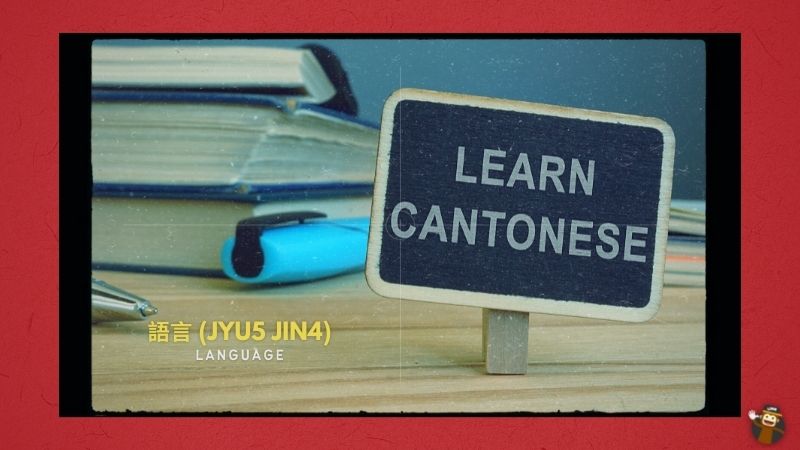A noun is an important part of speech. It’s one of the essential things to learn as a language learner, so are you ready to learn Cantonese nouns 名詞 or ming4 ci4? If you are, keep reading below!
The Cantonese word for “noun” is 名詞 (ming4 ci4). A noun is a word (other than a pronoun) used to identify any member of a group of persons, places, or things. It is one of the parts of speech you must learn with Cantonese pronouns, adjectives, and verbs. In learning a language, nouns are essential. Without nouns, it would be difficult to express your thoughts. Nouns are also crucial in understanding the basic sentence structure of a language. It also helps a learner in sentence construction, especially when at the advanced level of learning a language.
Cantonese is an analytical language, meaning that the way words are put together in a sentence is important to understand. A basic sentence has the form SVO, which means that the subject comes first, then the verb, and then the object. However, this order is often broken because Cantonese is a language that emphasizes the subject.
Today, we will learn about Cantonese nouns. You can start memorizing them so that you can easily recall them when you are put in a situation where you want to use them.
Learn Cantonese Nouns
Learning Cantonese nouns is essential in developing your language skills, especially constructing a sentence. So in this part of the blog, you will learn some Cantonese nouns and their meanings. You will also see example sentences and phrases for the vocabulary words you’ll learn. For the correct Cantonese pronunciation of the words, there is romanization that will guide you. This will help you improve your spoken Cantonese skills.
Here is a list of some nouns that you may run into or use a lot. This includes some singular and plural forms and feminine and masculine forms.
食物 (Sik6 Mat6) – Food
Example Sentence: 啲嘢好好食。 (di1 je5 hou2 hou2 sik6) – The food is delicious.

One of the most common Cantonese nouns you’ll usually hear is food (食物 sik6 mat6). Cantonese cuisine is known to have mild, fresh, natural, and slightly sweet flavors. When it comes to food, Cantonese food is no stranger for lots of us.
It is known all over the world, and Cantonese food like chow mein, Cantonese-style fried rice, and sweet and sour pork are still one of the people’s favorite Chinese food. And of course, when describing nouns like food, Cantonese adjectives are always included.
衣服 (Ji1 Fuk6)/ 衫 (Saam1) – Clothes
Example Sentence: 你嘅衫好好。(nei5 ge3 saam1 hou2 hou2.) – Your clothes are nice.

The next noun is “clothes.” Clothes are also one of the basic needs of a human. One of the most important clothes in the Cantonese culture is Qipao (旗袍 kei4 pou4). It is used on different special occasions such as weddings and celebrations. There are lots of things to talk about clothes; If you wanna learn more about clothes in Cantonese, you can check this blog out.
人 (Jan4) – Person/ People
Example Sentence: 當地人好友善。(dong1 dei6 jan4 hou2 jau5 sin6) – The local people are very friendly.

Aside from the beautiful tourist attractions, Hong Kong people or Hong Kongers can also be considered a treasure. Hong Kongers have different unique characteristics, one of which is an unparalleled love for their nation. Even though it is a specific administrative region of China, many Hong Kongers do not consider themselves Chinese. They refer to themselves as Hong Kongers or people of Hong Kong. So, it’s essential to learn to say “people (人 Jan4)” in Cantonese.
時間 (Si4 Gaan3) – Time
Example Sentence: 時間係黃金 (si4 gaan1 hai6 wong4 gam1) – Time is Gold

The next noun to learn is “time.” For a city as busy as Hong Kong, time is really important. It is one of the busiest cities in the world, so if you’re interested in going to Hong Kong for a long time, you must learn how to cope with the time. To begin with, you should start learning how to tell the time in Cantonese.
日 (Jat6) – Day
Example Sentence: 切順利 (jat1 cai3 seon6 lei6) – Have a good day.

Another noun to learn is “day (日 Jat6)”. Learning the days is important, especially when you’re traveling or doing business in Hong Kong. It’s also important to learn because it’s part of daily conversations.
年 (Nin4) – Year
Example Sentence: 新年快樂! (san1 nin4 faai3 lok6!) – Have a happy New Year!

One of the grandest celebrations in Chinese culture is the Chinese New Year. So, it’s essential to learn how to say the word “year (年 nin4)” in Cantonese. Years are important in the Chinese zodiac related to the Chinese calendar. The 12 years of the zodiac cycle are symbolized by a different zodiac animal, each with its own unique set of supposed virtues.
工 (Gung1) – Work
Example Sentence: 你喺邊度返工? (nei 5 hai2 bin1 dou6 faan1 gung1?) – Where do you work?

The next noun to learn is (工 Gung1), which means “work.” Many people go to Hong Kong to find work, and when it comes to career opportunities, it is a perfect place. Finding work in Hong Kong is a really serious thing. There is a lot of competition in finding work in Hong Kong, so you better bring your best foot forward.
公司 (Gung1 Si1) – Company
Example Sentence: 你對我哋公司有咩認識? (nei5 deoi3 ngo5 dei6 gung1 si1 jau5 me1 jing6 sik1?) – What do you know about this company?

The next noun is company (公司 gung1 si1). Hong Kong is home to many billionaires and huge companies such as AIA 11299.HK, AMTD Digital 2HKD, and Hong Kong Exchanges & Clearing 30388. HK.
政府 (Zing3 Fu2) – Government
Example Sentence: 瞭解香港政府。(liu4 gaai2 hoeng1 gong2 zing3 fu2.)- Get to know the Hong Kong government.

Another important basic noun that you’ll need to know is “government 政府 (zing3 fu2)”. The Hong Kong government is commonly known as HKSAR Government. For those who don’t know, Hong Kong is a special administrative region of China. They are under a constitutional principle of China which is the “One country, two systems” together with Macau. The history of Hong Kong and China can be traced down to the British colonization.
錢 (Cin2) Money
Example Sentence: 你有冇錢? (nei5 jau5 mou5 cin2?) – Do you have any money?

Money is also the one you shouldn’t miss. In Hong Kong, money is a real deal. Did you know that Hong Kong has the most number of billionaires in the world? If you’re in Hong Kong to earn money, there are lots of things to learn and to get you started, learn about Hong Kong’s currency.
語言 (Jyu5 Jin4) – Language
Example Sentence: 我同講呢個語言嘅人做朋友。 (ngo5 tung4 gong2 ni1 go3 jyu5 jin4 ge3 jan4 zou6 pang4 jau5.) – I make friends with people who speak that language.

Cantonese is the official language of Hong Kong. Even though it’s under the “One country, two systems” of China, Hong Kong does not use Mandarin as its official language. Of course, there are Mandarin speakers, but the locals usually use Cantonese and English as communication mediums.
So, if you’re going to Hong Kong, you might as well start learning Cantonese. Why not check out some of the best apps to learn Cantonese on your own?
文化 (Man4 Faa3) – Culture
Example Sentence: 呢個國家有好豐富嘅文化。(ni1 go3 gwok3 gaa1 jau5 hou2 fung1 fu3 ge3 man4 faa3) – This country has a rich culture.

One of the most exciting things about Hong Kong is its culture. Its rich history and colorful traditions are worthy of discovering. The culture of Hong Kong is a fusion of the traditional Han Cantonese ethnic culture of southeastern China, British culture, and Western culture in general. Hong Kong is located in southern China. The culture of China’s mainland is having an increasingly significant impact on Hong Kong’s population.
名勝 (Ming4 Sing3) – Tourist Attraction
Example Sentence: 香港有好多旅遊景點。(hoeng1 gong2 jau5 hou2 do1 leoi5 jau4 ging2 dim2) – There are many tourist attractions in Hong Kong.

The next noun is a tourist attraction (名勝 ming4 sing3). Hong Kong Skyline, Star Ferry, Victoria Peak (The Peak), and Hong Kong Disneyland. If you have already been to one of these famous tourist attractions in Hong Kong, then consider yourself lucky.
Aside from these, there are lots of other tourist sites in Hong Kong that you can visit. Before traveling to Hong Kong, get to know the availability of accomodations using Cantonese language. This can be a good practice for speaking and reading too!
朋友 (Pang4 Jau5) – Friends
Example Sentence: 我同講呢個語言嘅人做朋友。(ngo5 tung4 gong2 ni1 go3 jyu5 jin4 ge3 jan4 zou6 pang4 jau5.) – I make friends with people who speak that language.
Finally, one of the important Cantonese nouns that you should learn is friends 朋友 (pang4 jau5). Meeting friends can be a handful in a city as busy as Hong Kong. This will make you feel at home. By meeting new local friends in Hong Kong, you’ll get a chance to discover more about their culture and the people.
More Cantonese Nouns
Are you planning to learn Cantonese extensively? Here are more examples of nouns in Cantonese that you can start learning.
Relationships
| Cantonese | Jyutping Romanization | English Translation |
| 爸爸 | baa4 baa1 | father |
| 媽媽 | maa4 maa1 | mother |
| 家長 | gaa1 zoeng2 | parent |
| 細路 | sai3 lou6 | child |
| 仔 | zai2 | son |
| 女 | neoi5 | daughter |
| 老婆 | lou5 po4 | wife |
| 老公 | lou5 gung1 | husband |
| 叔叔 | suk1 suk1 | uncle |
| 孫 | syun1 | grandchild |
| 女朋友 | neoi5 pang4 jau5 | girlfriend |
| 男朋友 | naam4 pang4 jau5 | boyfriend |
| 表姐妹 | biu2 ze2 mui6 | cousin |
| 鄰居 | leon4 geoi1 | neighbor |
People And Occupation
| Cantonese | Jyutping Romanization | English Translation |
| 男人 | naam4 jan2 | man |
| 女人 | neoi5 jan2 | woman |
| 背包客 | bui3 baau1 haak3 | backpacker |
| 商人 | soeng1 jan4 | businessman |
| 公務員 | gung1 mou6 jyun4 | civil servant |
| 醫生 | ji1 sang1 | doctor |
| 工程師 | gung1 cing4 si1 | engineer |
| 消防員 | siu1 fong4 jyun4 | firefighter |
| 律師 | leot6 si1 | lawyer |
| 經理 | ging1 lei5 | manager |
| 報館 | bou3 gun2 | newspaper publisher |
| 護士 | wu6 si6 | nurse |
| 警察 | ging2 caat3 | police |
| 遊客 | jau4 haak3 | tourist |
| 作家 | zok3 gaa1 | writer |
Body Parts
| Cantonese | Jyutping Romanization | English Translation |
| 手臂 | sau2 bei3 | arm |
| 背脊 | bui3 zek3 | back |
| 身體 | san1 tai2 | body |
| 胸 | hung1 | chest |
| 手指 | sau2 zi2 | finger |
| 腳 | goek3 | foot |
| 手 | sau2 | hand |
| 頭 | tau4 | head |
| 腿 | teoi2 | leg |
| 肚 | tou5 | stomach |
Hobbies
| Cantonese | Jyutping Romanization | English Translation |
| 烘焙 | hong3 bui6 | baking |
| 背包自助旅行 | bui3 baau1 zi6 zo6 leoi5 hang4 | backpacking |
| 書法 | syu1 faat3 | calligraphy |
| 烹飪 | paang1 jam6 | cooking |
| 釣魚 | diu3 jyu4 | fishing |
| 行山 | haang4 saan1 | hiking |
| 玩樂器 | waan2 ngok6 hei3 | play musical instrument |
| 陶藝 | tou4 ngai6 | pottery |
| 行街 | haang4 gaai1 | shopping |
| 游水 | jau4 seoi2 | swimming |
| 睇戲 | tai2 hei3 | watch movies |
Places
| Cantonese | Jyutping Romanization | English Translation |
| 銀行 | ngan4 hong4 | bank |
| 教堂 | gaau3 tong2 | church |
| 咖啡室 | gaa3 fe1 sat1 | coffee shop |
| 藥房 | joek6 fong4 | drug store, pharmacy |
| 醫院 | ji1 jyun2 | hospital |
| 子 | fong4 zi2 | house |
| 圖書館 | tou4 syu1 gun2 | library |
| 警察局 | ging2 caat3 guk2 | police station |
| 餐廳 | caan1 teng1 | restaurant |
| 學校 | hok6 haau6 | school |
| 廁所 | ci3 so2 | toilet |
| 洗手間 | sai2 sau2 gaan1 | washroom/bathroom |
School
| Cantonese | Jyutping Romanization | English Translation |
| 背包 | bui3 baau1 | backpack |
| 書本 | syu1 bun2 | book |
| 計數機 | gai3 sou3 gei1 | calculator |
| 同學 | tung4 hok6 | classmate |
| 考試 | haau2 si3 | exam |
| 膠水 | gaau1 seoi2 | glue |
| 作業 | zok3 jip6 | homework |
| 借書卡 | ze3 syu1 kaat1 | library card |
| 筆記簿 | bat1 gei3 bou2 | notebook |
| 原子筆 | jyun4 zi2 bat1 | pen |
| 鉛筆 | jyun4 bat1 | pencil |
| 學生 | hok6 sang1 | student |
| 主旨 | zyu2 zi2 | subject |
| 大學 | daai6 hok6 | university |
House
| Cantonese | Jyutping Romanization | English Translation |
| 沖涼 | cung1 loeng4 | bath |
| 床 | mou4 zin1 | blanket |
| 衣櫃 | ji1 gwai6 | closet |
| 椅子 | ji2 zi2 | chair |
| 飯枱 | faan6 toi2 | dining table |
| 叉 | caa1 | fork |
| 報紙 | bou3 zi2 | newspaper |
| 枕頭 | zam2 tau | pillow |
| 梳化 | so1 faa2 | sofa |
| 匙羹 | ci4 gang1 | spoon |
| 洗頭 | sai2 tau4 | shampoo |
| 番梘 | faan1 gaan2 | soap |
| 洗手間 | sai2 sau2 gaan1 | toilet |
| 廁紙 | ci3 zi2 | toilet paper |
| 牙刷 | ngaa4 caat2 | toothbrush |
| 牙膏 | ngaa4 gou1 | toothpaste |
| 電視 | din6 si6 | television |
| 枱 | toi2 | table |
Travel
| Cantonese | Jyutping Romanization | English Translation |
| 酒店式公寓 | zau2 dim3 sik1 gung1 jyu6 | apartment hotel |
| 登機證 | dang1 gei1 jing3 | boarding pass |
| 班機 | baan1 gei1 | flight |
| 酒店 | zau2 dim3 | hotel |
| 行李 | hang4 lei5 | luggage |
| 護照 | wu6 jiu3 | passport |
| 個人身份證 | go3 yan4 san1 fan6 jing3 | personal ID card |
| 票 | piu3 | ticket |
| 簽證 | chim1 jing3 | visa |
Transportation
| Cantonese | Jyutping Romanization | English Translation |
| 飛機 | fei1 gei1 | airplane |
| 機場 | gei1 ceong4 | airport |
| 巴士 | baa1 si2 | bus |
| 巴士站 | baa1 si2 zaam6 | bus stop |
| 車 | ce1 | car |
| 車費 | ce1 fai3 | fare (transportation with wheels) |
| 渡輪 | dou6 leon4 | ferry |
| 小巴 | siu2 baa1 | minibus |
| 地鐵 | dei6 tit3 | subway |
| 的士 | dik1 si2 | taxi |
| 電車 | din6 ce1 | tram |
Food And Dining
| Cantonese | Jyutping Romanization | English Translation |
| 牛肉 | ngau4 juk6 | beef |
| 帳單 | zoeng3 daan1 | bill |
| 中菜 | zung1 coi3 | Chinese food |
| 廚師 | cyu4 si1 | chef |
| 雞肉 | gai1 juk6 | chicken (meat) |
| 筷子 | faai3 zi2 | chopsticks |
| 咖啡 | gaa3 fe1 | coffee |
| 信用卡 | seon3 jung6 kaat1 | credit card |
| 晚餐 | maan5 caan1 | dinner |
| 炒飯 | cau2 faan6 | fried rice |
| 即溶咖啡 | zik1 jung4 gaa3 fe1 | instant coffee |
| 餐單 | caan1 daan1 | menu |
| 豬肉 | zyu1 juk6 | pork |
| 飯 | faan6 | rice (cooked) |
| 貼士 | tip1 si2 | tip |
| 侍應 | si6 jing3 | waitress/waiter |
| 水 | seoi2 | water |
Appliances
| Cantonese | Jyutping Romanization | English Translation |
| 冷氣 | laang5 hei3 | air conditioner |
| 風扇 | fung1 sin3 | electric fan |
| 電飯煲 | din6 faan6 bou1 | electric rice cooker |
| 微波爐 | mei4 bo1 lou4 | microwave oven |
| 焗爐 | guk6 lou4 | oven |
| 雪櫃 | syut3 gwai6 | refrigerator |
| 爐 | lou4 | stove |
| 吸塵 | kap1 can4 | vacuum |
| 洗衣機 | sai2 ji1 gei1 | washing machine |
Technology
| Cantonese | Jyutping Romanization | English Translation |
| 電子郵件 | din6 zi2 jau4 gin2 | |
| 手機 | sau2 gei1 | cellphone |
| 電腦 | din6 nou5 | computer |
| 座枱電腦 | zo6 toi2 din6 nou5 | desktop computer |
| 下載 | haa6 zoi3 | download |
| 筆記型電腦 | bat1 gei3 jing4 din6 nou5 | laptop computer |
| 互聯網 | wu6 lyun4 mong5 | Internet |
| 鍵盤 | gin6 pun2 | keyboard (computer) |
| 顯示屏 | hin2 si6 ping4 | monitor (computer) |
| 滑鼠 | waat6 syu2 | mouse (computer) |
| 搜尋 | sau2 cam4 | search |
| 社交媒體 | se5 gaau1 mui4 tai2 | social media |
| 上載 | soeng6 zoi3 | upload |
| 網頁 | mong5 jip6 | webpage |
| 網站 | mong5 zaam6 | website |
Nature
| Cantonese | Jyutping Romanization | English Translation |
| 氣 | hei3 | air |
| 雲 | wan4 | cloud |
| 田 | tin4 | field |
| 火 | fo2 | fire |
| 花 | faa1 | flower |
| 森林 | sam1 lam4 | forest |
| 地 | dei6 | ground |
| 冰 | bing1 | ice |
| 湖 | wu4 | lake |
| 電 | din6 | lightning |
| 月 | jyut6 | moon |
| 山 | saan1 | mountain |
| 雨 | jyu5 | rain |
| 河 | ho4 | river |
| 沙 | saa1 | sand |
| 海 | hoi2 | sea |
| 天 | tin1 | sky/heaven |
| 土 | tou2 | soil |
| 星 | sing1 | star |
| 石 | sek6 | stone |
| 川 | cyun1 | stream |
| 日 | jat6 | sun |
| 水 | seoi2 | water |
| 木 | muk6 | wood |
Abstract Ideas
| Cantonese | Jyutping Romanization | English Translation |
| 仁愛 | jan4 ngoi3 | charity |
| 友誼 | jau5 ji4 | friendship |
| 歡樂 | fun1 lok6 | happiness |
| 希望 | hei1 mong6 | hope |
| 傷心 | soeng1 sam1 | sadness |
| 愛 | oi3 | love |
| 運氣 | wan6 hei3 | luck |
| 耐性 | noi6 sing | patience |
| 毅力 | ngai6 lik6 | persistence |
| 功率 | gung1 leot6 | power |
| 成功 | sing4 gung1 | success |
| 信任 | seon3 jam6 | trust |
| 智慧 | zi3 wai3 | wisdom |
Start Your Cantonese Lesson With Ling
After learning about nouns in Cantonese, what do you want to know for your next lesson? Learn more than just Cantonese nouns. Master all your language skills with Ling app. With the app’s features, learning Cantonese can be fun yet practical.
With Ling app, you’ll have an opportunity to learn a wide range of topics about your target language. It will develop both your spoken and written language skills. You’ll be able to understand the meaning of the words you are learning through translations and romanization. It has audio recordings to practice the words you are hearing.
Learning a language with Ling app is convenient. You won’t need to carry your dictionary everywhere. All you need is the internet and gadget, and you can start learning. You can go directly to the site or download the app. Just click the links in this blog, which will direct you to the site. So, start your language journey and learn the Cantonese language with Ling app now!


















